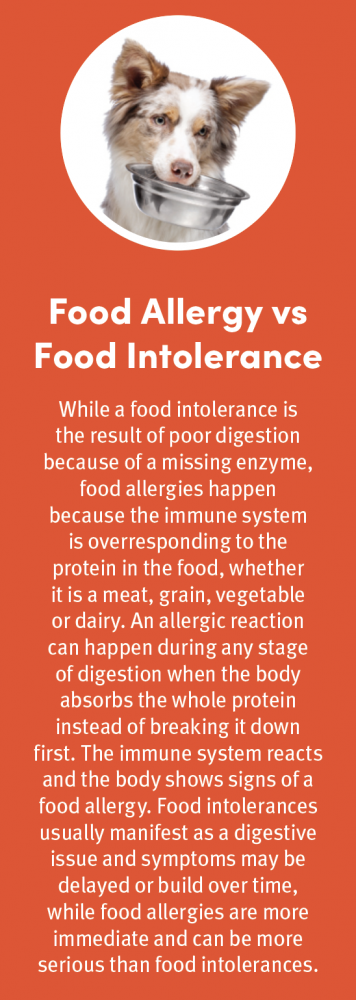

Does My Dog Have a Food Allergy?
Is what you're feeding your dog making her sick?

Your poor dog has been scratching, suffering ear infections, and experiencing gastrointestinal problems. You keep bringing your pup to the vet, only to have the problem disappear following treatment—and then return. Your dog’s discomfort is your distress, and you’re at your wit’s end.
It could be a food allergy, the diagnosis of which is becoming more and more prevalent, due to increased awareness among pet owners.
Food allergies are common in dogs, but unfortunately, they often go undetected or unrecognized as the underlying cause of many skin or intestinal conditions, says Dr. Jonathan Bloom, medical director of the Willowdale Animal Hospital in North York, ON.
“Often, I see pets that have been treated for many different and seemingly unrelated conditions,” says Dr. Bloom. “Pet owners just think that their pet is a lemon. But when I see a pet that has a long history or some combination of itchy eyes, itchy face, itchy feet, recurrent ear problems, bum issues that include scooting and the need for frequent emptying of the anal sacs, skin infections, or pets with ‘sensitive stomachs,’ I don’t see a lemon of a pet—I see a pet that has a high likelihood of having been suffering from an underlying allergy.”
Why do food allergies show up as gut and skin issues in dogs?
When the cells in your body that react to an allergen are triggered, they release histamine, which causes inflammation where the histamine is released, explains Dr. Bloom. “In people, those cells are in high concentration near the throat and lungs so affected people have problems breathing. In pets, those histamine cells are in high concentration in their gut and skin, so they react with gastrointestinal issues and skin issues.”
Signs and Symptoms
Some breeds of dogs—including Boxers, Cocker Spaniels, Springer Spaniels, Collies, Dachshunds, Dalmatians, German Shepherds, Lhasa Apsos, Miniature Schnauzers, Retrievers, and West Highland White Terriers—are more prone to food allergies than others, but of course, any dog can experience food allergies. As well, some foods are more likely to cause allergic reactions. The most common canine food allergies are to dairy, wheat, and beef, and the least common are to fish and rabbit.
Symptoms of allergies include dry itchy skin, chronic skin problems, excessive scratching or licking, bald patches, a high frequency of hot spots, ear infections, diarrhea, and vomiting. “Signs that your pet has a food allergy are typically limited to the skin and to the intestinal tract,” confirms Dr. Bloom. “Skin infections include ear problems because ears are just skin folded up into a funnel shape.
“Food allergies that manifest as skin problems typically cause itch, scab, or sores in areas that I often describe as the tips and folds. If your pet has changes to the tips, like an itchy face, itchy feet, itchy bum, or ear problems—start thinking allergies. Similarly, if your pet has changes to the folds that are under the arms or in the groin area—start thinking allergies. Food allergies that manifest as gastrointestinal signs are pretty easy to recognize, essentially chronic vomiting and diarrhea, gas, and/or itchy bums. If you think your pet has a ‘sensitive stomach,’ start thinking food allergies.”
Angela Clark’s Rottweiler-Lab mix, Joker, suffered from recurring yeast ear infections.
“Finally, a vet said it could be what he eats,” says Angela, who lives in Mobile, AL. After changing his diet at the vet’s recommendation, Angela found that Joker had trouble with beef, chicken, wheat, corn, and soy.
If you suspect your dog has a food allergy, the first thing to do is have your vet rule out other medical conditions. The next is to strategically change your dog’s diet so you can isolate the problem ingredients and eliminate them. “As frustrating as allergies may be, they can often be successfully managed,” says Dr. Bloom.
Elimination Diet—What Is It?
Once your vet has ruled out other illnesses, it’s time to find out what your dog is allergic to, commonly through an elimination diet.
Angela says that Joker “suffered for two years before their vet recommended an elimination diet.

It takes diligence. Changing to an elimination diet won’t work if your baby son or daughter just dumps the tray of their highchair onto the floor, allowing the dog to eat the spilled chicken, says Dr. Bloom. Similarly, people cannot “sneak a little treat now and then of something that is chicken based.”
“When my sister and her dog moved in, I told her about Joker’s allergies,” says Angela. “She was used to giving her dog table food as she cooked. I would find Joker shaking his head and I would ask her, ‘what did you give Joker?’… I told her his ears told me. She then confessed. After making her clean and medicate his ears a couple of times, she quit feeding him. As long as he remains on his diet, he does well.”
For Jodi Ralston, it took a couple of weeks to see results after changing her Great Dane-Lab mix’s diet.
At age five, Ellie began suffering from ear infections. “She was getting so many ear infections and we had her on so many different antibiotics,” says the Barron, WI resident. “The vet would give her meds, and they weren’t working.” Jodi did some research and learned chicken was a common allergen. “We took her off all fowl and she’s been good since—no more antibiotics of any kind.” Ellie is now on a diet of lamb and rice.
A vet may also recommend a hypoallergenic diet, which consists of foods where the proteins are already broken down, so that the body doesn’t have to do the work and in the process trigger an immune response.
When Food Allergies Become Serious
The good news is that unlike in people, reactions in dogs and cats are not typically severe or life-threatening at the onset, says Dr. Bloom. “However, the reaction in the gut can cause secondary changes which lead to chronic vomiting, diarrhea, gas, and problems around the anus. Reaction in the skin can cause secondary bacterial or yeast changes which lead to chronic itch and skin sores. These secondary changes can sometimes have life altering consequences for the pet.”
The second piece of good news is that food allergies aren’t likely to be suddenly fatal. Rather, allergies that remain undiagnosed or unaddressed often lead to numerous chronic and long-standing symptoms that are debilitating, frustrating, and compromising to the human-animal bond, says Dr. Bloom.
“If your pet has changes to the tips, like an itchy face, itchy feet, itchy bum, or ear problems—start thinking allergies.”
Donna Warner’s five-year-old Australian Shepherd-Retriever-Rottweiler mix, Nova, has pancreatitis triggered by an intolerance to high-fat foods.
“We are super careful with food and snacks,” says Donna, of Halifax, N.S. “It's hard sometimes as she loves bacon as much as we do. Diagnosed three years ago, Nova suffered from diarrhea and was vomiting and couldn't keep anything down. “We took her to the vet on day two as the poor girl was dry heaving in the backyard in the morning.”
Nova was restricted to salmon-based low-fat food. “Her snacks are typically chicken jerky or homemade dried sweet potato slices,” says Donna. “We really watch the fat content. She has had a couple of small flare ups since then, however we always keep gastro canned food on hand in case we notice something out of the norm.”
In addition to food allergies and intolerances causing other medical issues, it also works the other way, with medical issues causing food allergies. Gastroenteritis, for example, can weaken a dog’s system to the point where the animal may develop food allergies.
Pet owners must remember that allergies are a chronic condition. “They typically stay with you for life,” says Dr. Bloom. “Your veterinarian is likely the most qualified person to guide you through the allergy diagnosis and to help create a management plan that works for both you and your pet. Be diligent, be patient, and invest your time up front to get to the root cause—it could save you years of frustration.” On the bright side, a food allergy is not the end of the world. “It is likely that the allergy can be managed, and your pet can live a long happy life,” Dr. Bloom says.
Join the newsletter and never miss out on dog content again!
"*" indicates required fields
By clicking the arrow, you agree to our web Terms of Use and Privacy & Cookie Policy. Easy unsubscribe links are provided in every email.







